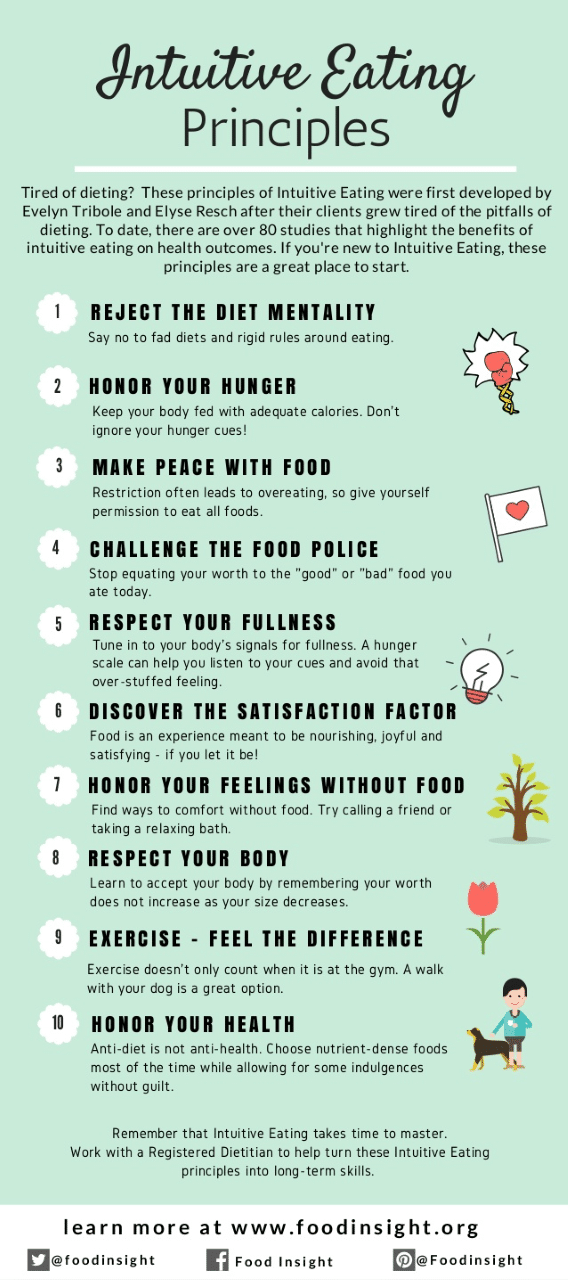Let’s focus our intentions on Intuitive Eating and typically what it feels like to practice these skills.
Unlike starting (or restarting) a diet, Intuitive Eating doesn’t have a “day one.”
Fad diets are usually easiest to make perfect on that first day but then become harder and harder to replicate as the days go by.
Intuitive Eating is the exact opposite. It feels the most tricky and messy in the first few months while we’re fumbling around trying to understand our bodies’ signals and dismantle years (or decades) of diet-mentality. Diet and mental health co-mingle.
Just like everyone struggles to speak a new language in the beginning, pretty much everyone struggles with Intuitive Eating in the beginning.
- Fad diets are usually a predetermined generalized plan (that are not personalized to the unique you and your lifestyle – that’s why they don’t last long).
- Intuitive Eating is about learning to connect to your body and practicing neutral awareness skills. This involves physical, mental, and emotional awareness, which takes time to make the connections, BUT can never be unlearned.
- With Intuitive Eating we commit to a practice of habitual learning, understanding that the language of our bodies (and hearts) cannot be mastered on day one and must by daily efforts (but does become easier!).
As a reminder of what Intuitive Eating is all about, let’s look at the 10 principles:

So how do you start Intuitive Eating? Here are some steps you can take in the next few months. Try one or some on!
- Watch those thoughts and compulsions to try the latest new fad diets and just don’t engage. “Unfollow” all the body and weight-focused people. Just do it. See how much better you feel. I promise you won’t blow up like a balloon because you don’t see a fat phobic post or another fitness modeling picture.
- Plan what food you are going to have and when before you become hungry. This ensures that you always have nourishing foods on hand and that you always have what your body needs.
- If you’re hungry, eat something. Sounds simple right? Many people think they need to deprive themselves to be healthy. This is false. You are opposing your physiology and the body always wins. You will rebound-eat like a mother later. Trust me.
- Don’t deprive yourself of specific foods. Eat that pasta. If you keep yourself from certain “fear foods” you will have compensatory behaviors such as binge eating, then you wind up feeling guilty. It’s a vicious cycle. Eat the darn pasta and move on.
- Stop eating when you are 80% full. This is body honoring! This is not for the pursuit of weight loss but to listen to your body cues and act accordingly. Check out the hunger scale to assess your hunger and fullness level before, midway, and after the meal. You will feel more energetic if you aren’t to the overly stuffed point. It also takes 20-30 minutes for your gut signals to tell the brain how much food has been consumed. It also matters if you were mindful when you were eating the food. If you were more checked out, your signals will not be as strong and you might find yourself consuming more than your body needs. To learn more about mindful eating, click here. Mindful eating is different than Intuitive Eating.
- Sooth and comfort yourself away from food. The first question is (and use that hunger scale) am I actually hungry for food? If you find that your gut feels calm and satisfied (or however your satiated sensations reside in your body), it’s time to dig deeper and find what else you are needing. I encourage everyone to have a list of self-soothing/comfort activities when they are feeling like they “need something.” Here is a nifty little worksheet you can try on your own.
- Practice body acceptance. You don’t need to jump to body love/positivity if you are so far to one side of how you feel about your body. Start with an idea of what does my body actually do for me? What are its functions? Breakdown from the bottom up (start with your feet/toes, then go to ankles, calves, and keep going up till you reach your head). This will propel your mind to a more neutral space instead of the judgements and old narratives you may carry. Keep practicing. Here is a simple worksheet.
- Joyful exercise. Find ways to move your body daily that feels good and what you want to go back to. Everyday may be different, but really practice creative and flexible thinking. Maybe that hard hitting cycle sculpt class is not something you want to embark on today, but perhaps it’s an outdoor walk and yoga. It doesn’t matter – just start moving and your body will send you reward signals back within minutes! It’s important to not rely solely on the extrinsic numbers as well (the calories, heart rate, etc). Keep moving your attention to internal feedback such as less pain, better mood, agile body, etc.
I would love to hear how this plays out for you! Keep practicing these principals through the next few months. Hopefully by January 1st you won’t fall for the latest fad diet and body shaming social media.
If you find your suffering is insurmountable, it’s time to reach out to a mental health professional with proper credentials.
Your feel good champion,
Miriam Jirari (she/her) MPH, RDN, CPT
Intuitive Eating Counselor and Studio SWEAT Dietitian
Resources:










Comments - 0